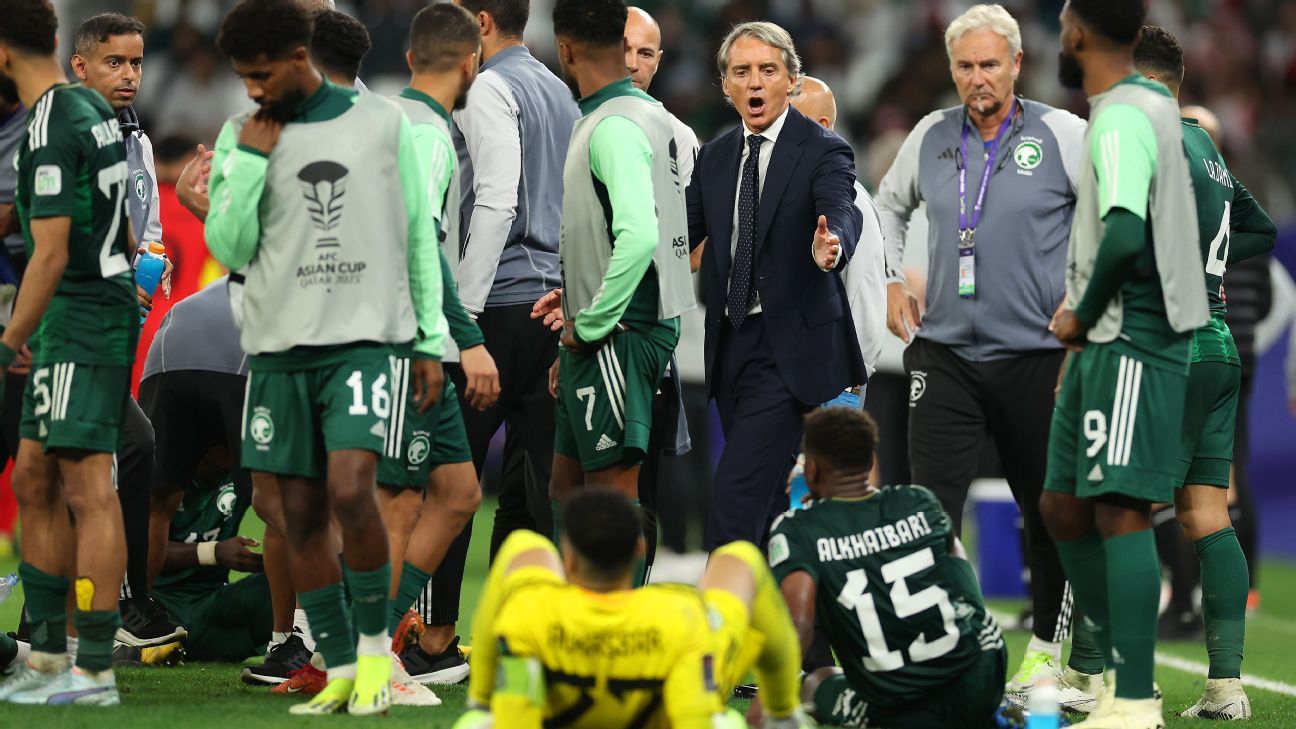On paper, a round of 16 exit at the 2023 AFC Asian Cup would always have been a disappointment for heavyweights such as Saudi Arabia.
And it was, as they succumbed to a 4-2 penalty shootout defeat to South Korea following a 1-1 draw to bow out at the first hurdle of the knockout stage.
Yet, perhaps the disappointment was more from the manner in which they were eliminated and the accompanying feeling of a missed opportunity to end a 28-year wait to be crowned continental champions, rather than the actual performance the Green Falcons produced on Tuesday night -- or even throughout their campaign.
And while the knee-jerk reaction will be to question if a managerial change is required, it would be extremely hasty to question the future of Roberto Mancini.
Granted, the highly-credentialled Italian has not rubbed everyone the right way since he took over the job last August, signing a contract through to 2027.
He has a tense relationship with parts of the local media and has not been afraid to wield the axe with established stars, which has reportedly led to slight unrest among the playing group and certainly among the fans.
But putting aside Mancini's reputation and past achievement, he is a man who certainly looks like he has a plan with Saudi Arabia.
Lest it is forgotten, given the headlines have surrounded South Korea's incredible escape, the Green Falcons were literally a minute away from advancing to the quarterfinals -- until Cho Gue-Sung's dramatic 99th-minute equaliser forced extra-time, and then the shootout which South Korea prevailed in.
How different the narrative would have been.
Up till that point, Mancini was a genius who had pulled off a masterful victory over fellow powerhouses to take Saudi Arabia one step closer to a first Asian Cup title since 1996.
The pressure and scrutiny was, in fact, headed the way of his opposite number Jurgen Klinsmann, who is also not everyone's cup of tea in South Korean football -- although that is a different story for another day.
Mancini has done a lot of things right, both against South Korea and in the mere five months or so that he has been at the helm.
While it was no surprise that both teams adopted a cautious approach on Tuesday night, Mancini was the first to make a positive change -- at halftime when he brought on 20-year-old Abdullah Radif for Saleh Al-Shehri.
Within 34 seconds, Radif fired Saudi Arabia into the lead.
Mancini's subsequent substitutions would ultimately backfire with star man Salem Al-Dawsari no longer on the pitch to provide a spark once they needed to score again, but they were understandable at the time.
They were holding out for the 1-0 win and they were doing a good job until that point -- removing Al-Dawsari with just six minutes of the 90 remaining was a move almost any other coach would have made.
Fate -- along with South Korea's unrelenting approach and undeniable quality -- just had other ideas.
It is also interesting to note that it was the exciting Radif who Mancini decided to introduce at the break, when he could easily have called upon the more-experienced Firas Al-Buraikan.
This speaks not only about Mancini's sense of adventure in veering away from the predictable, but also his faith in youth.
Although Saudi Arabia are well established as one of Asian football's leading lights, there is a sentiment that the squad is in desperate need of rejuvenation.
Stalwarts such as Al-Dawsari, Al-Shehri, Ali Al-Bulaihi and Mohammed Al-Breik are all in their 30s. There would have been more present at the Asian Cup if not for injury and several falling on the wrong side of Mancini's strict disciplinary code.
Radif looks one for the future, as does Talal Haji, who showed glimpses of his potential after coming on in the group-stage game against Thailand as he became the youngest player in Asian Cup history at the age of 16 years and 131 days.
There have been similar success stories even among those not quite so youthful.
27-year-old Ali Lajami has come from nowhere but will surely be mentioned among the tournament's best defenders when it eventually concludes, while goalkeeper Ahmed Al-Kassar had not even been capped prior to the start of the competition but looks set to be Saudi Arabia's first-choice goalkeeper for the foreseeable future after a string of impressive displays.
Reputations have mattered little for Mancini. Instead, he has been willing to put his faith in those who have shown they deserve an opportunity -- and has been vindicated even if their Asian Cup exit is earlier than they would have liked.
Fittingly, it is not his reputation but rather what he has shown that makes him deserving of his opportunity to be given a little faith of his own to prove he is the man to lead Saudi Arabia forward.


